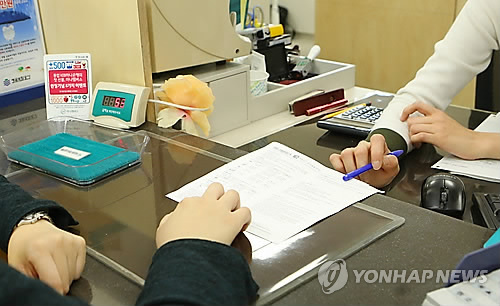Korean banks' net income falls 32% on corporate restructuring
By KH디지털2Published : March 6, 2017 - 10:04
South Korean banks reported a sharp drop in their net income last year, hit by massive loan loss spending to handle troubles in the shipbuilding industry, data showed Monday.
Their combined net profits came to 3 trillion won ($2.6 billion) in the year, down 31.8 percent from 2015, according to the Financial Supervisory Service.

Specialized banks, including such state policy lenders as the Korea Development Bank and the Export-Import Bank of Korea, suffered a net loss of 3.5 trillion won last year, far more than 600 billion won posted a year earlier.
Their loan loss expenses rose by 2.2 trillion won to 8.9 trillion won amid the restructuring of Daewoo Shipbuilding & Marine Engineering and STX Offshore & Shipbuilding Co.
The KDB posted 3 trillion won in net losses in 2016, the largest deficit since 1998 when the country was reeling from a foreign exchange crisis.
In contrast, the net profit of commercial banks headquartered in Seoul jumped 32.5 percent on-year to 5.5 trillion won in 2016.
Meanwhile, the return on assets of South Korea's banks dipped to 0.13 percent, down 0.08 percentage point, with the return on equity also sliding 0.93 percentage point to 1.65 percent.
Both the ROA and ROE recorded the lowest level since 2000.
Their interest income rose 2.7 percent to 34.4 trillion won.
"This was because the value of assets under management rose 5.8 percent, while the net interest margin was reduced," the FSS said. "The NIM sank to an all-time low of 1.55 percent due to a continued fall in loan-deposit margin."
Their non-interest income decreased 1.1 trillion won to 4.9 trillion won in the year due to declines in service fees and commissions as well as securities income.
Commercial banks’ ROA and ROE added 0.08 percentage point and
0.99 percentage point to 0.45 percent and 5.88 percent, respectively. (Yonhap)




![[Herald Interview] 'Amid aging population, Korea to invite more young professionals from overseas'](http://res.heraldm.com/phpwas/restmb_idxmake.php?idx=644&simg=/content/image/2024/04/24/20240424050844_0.jpg&u=20240424200058)

![[Pressure points] Leggings in public: Fashion statement or social faux pas?](http://res.heraldm.com/phpwas/restmb_idxmake.php?idx=644&simg=/content/image/2024/04/23/20240423050669_0.jpg&u=)












